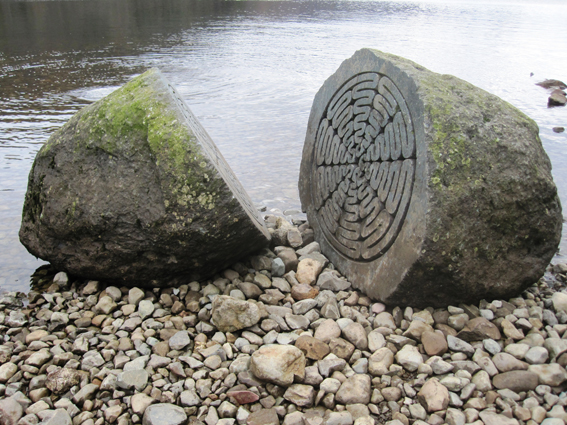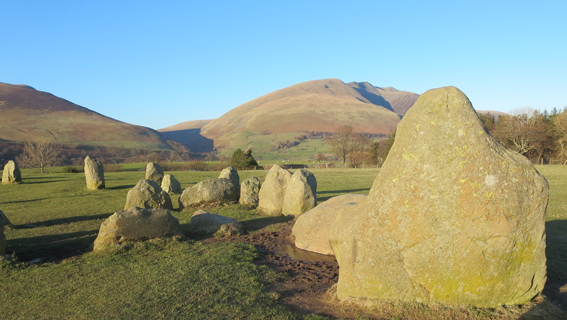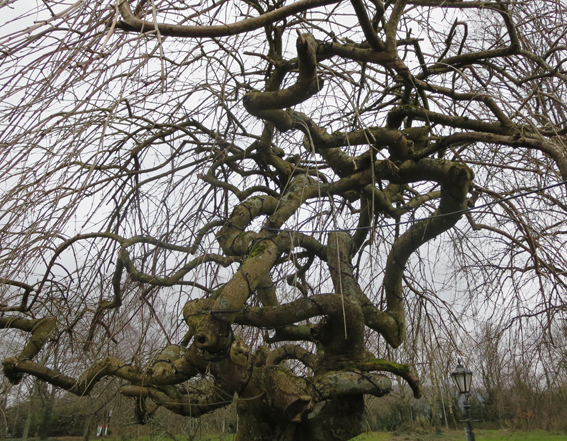
After the storm on our first night here — with six inches of rain overnight — we’ve been enjoying fantastic weather for the last few days, with nearly all meals now taken outside. Also hugely enjoyable were the two talks by amazingly bright and charismatic speakers on Tuesday: Tom Holland and George Monbiot.
Tom Holland (pictured here with Stephen Bristow) has recently translated the whole of Herodotus, so his talk was entitled Herodotus  and the Ancient World. His portrayal of Herodotus, the first historian, as a precursor of Google might have been a little fanciful, but in terms of following threads within the Histories, going off at tangents to investigate and pursue something of current fascination and skimming to find the bits of most interest, there were certainly some parallels.
and the Ancient World. His portrayal of Herodotus, the first historian, as a precursor of Google might have been a little fanciful, but in terms of following threads within the Histories, going off at tangents to investigate and pursue something of current fascination and skimming to find the bits of most interest, there were certainly some parallels.
Herodotus was writing between 440 and 430BC, and he lived in Ionia, in modern-day Turkey. His stories of the Persian Wars were what first attracted Holland to him at the age of 11, and Holland has loved his work ever since. It took him six years to translate the Histories, taking one paragraph every day without fail, regardless of holidays or any other excuses for not writing.
I must admit to being a fan of George Monbiot’s, so was delighted that he was featuring at the  festival. From the applause at the end of his talk it was evident that I wasn’t the only one to appreciate his entertaining and informative lecturing style, his wide-ranging interests and his quirky sense of humour.
festival. From the applause at the end of his talk it was evident that I wasn’t the only one to appreciate his entertaining and informative lecturing style, his wide-ranging interests and his quirky sense of humour.
George was talking about his recent book, Rewilding: the talk began with elephants, proceeded through hedge-laying, upland farming and the ‘shifting baseline syndrome’ and took in a range of megafauna, farming subsidies and reforestation. His main thesis is that we should be returning the country — or at least a good part of it — to forest, and that the (beautiful) bare fells of the Lake District, with their attendant extensive sheep-farming, are bad for the environment. He would also like to re-introduce some to the species of fauna that we’ve lost, such as beavers and pine martens. I hadn’t realised before that the presence of pine martens can actually increase the incidence of red squirrels. Apparently they were introduced into Ireland some time ago, and as they chase squirrels, the greys cannot get away from them while the lighter, more agile, reds are able to find protection at the ends of branches; so the greys are diminishing while the reds are increasing.
Monbiot’s message, which was characterised by hope rather than pessimism, is one of positive environmentalism. There were Lakeland farmers in the audience who were not happy about Monbiot’s approach; but Monbiot is a deep thinker who not only has something of a feral nature himself, but is also blessed with a huge brain, extensive knowledge and a charming manner, so while it is possible to dispute some of his ideas, I think we should all hear and reflect upon what he has to say.
We took the day off on Wednesday, and as the sun was beating down we decided to walk all round  Derwentwater. It’s a distance of a little over nine miles, but there’s a good spot for lunch half-way round where, yet again, we were able to eat outside. The terrain has been improved since the last time we trekked round the lake, so the walking was not difficult, and it was certainly a day for shorts and tee shirts. We were surrounded every minute of the day by so much beauty, both in the countryside through which we passed and also in the individual trees, flowers and lichens that we stopped to admire on the way.
Derwentwater. It’s a distance of a little over nine miles, but there’s a good spot for lunch half-way round where, yet again, we were able to eat outside. The terrain has been improved since the last time we trekked round the lake, so the walking was not difficult, and it was certainly a day for shorts and tee shirts. We were surrounded every minute of the day by so much beauty, both in the countryside through which we passed and also in the individual trees, flowers and lichens that we stopped to admire on the way.
 We still had the energy to return to the theatre for the evening where we had a lecture about WikiLeaks by David Leigh, the former Guardian correspondent who co-authored the book about WikiLeaks with Luke Harding. This was followed, after an interval, with the film The Fifth Estate, which was a dramatised portrayal of the phenomenon of WikiLeaks and of its instigator, Julian Asange.
We still had the energy to return to the theatre for the evening where we had a lecture about WikiLeaks by David Leigh, the former Guardian correspondent who co-authored the book about WikiLeaks with Luke Harding. This was followed, after an interval, with the film The Fifth Estate, which was a dramatised portrayal of the phenomenon of WikiLeaks and of its instigator, Julian Asange.
 Moving on to Thursday evening, I went to hear Richard Harries, the former Bishop of Oxford, talk on the subject of his latest book, Modern Art: A Friend of Christianity? I’ve lectured many times myself on the subject of religious art, so was interested to to hear what he had to say and to see which works of art he chose to show. One of the attractive features of his presentation was that he allowed us some silence in which to engage with the pictures, instead of talking the whole time. We were treated to a wide range of artists to support Harris’s thesis that modern art is the friend of Christianity rather than its foe.
Moving on to Thursday evening, I went to hear Richard Harries, the former Bishop of Oxford, talk on the subject of his latest book, Modern Art: A Friend of Christianity? I’ve lectured many times myself on the subject of religious art, so was interested to to hear what he had to say and to see which works of art he chose to show. One of the attractive features of his presentation was that he allowed us some silence in which to engage with the pictures, instead of talking the whole time. We were treated to a wide range of artists to support Harris’s thesis that modern art is the friend of Christianity rather than its foe.
The final lecture of the day was a tour de force by Simon Thurley, author of The Building of England, who guided us through a  history of England through architecture. He describes himself on his website as ‘an historian, archaeologist, curator, writer, broadcaster, museum director and heritage crusade’ and he appears to be an expert in each of these fields. He is now Chief Executive of English Heritage. Instead of tracing the history of architecture through chronology, dynasties or styles, Thurley does it through the people who built and used the buildings: what they built, why they built them, and what the buildings tell us about those people. Rather than an exegesis on columns, then, or the appropriate names given to stylistic changes, we had flying shuttles, steam engines, fire grates, the Black Death, the rise of Britain’s (especially London’s) dominance in the world and population decline and increase — all absolutely fascinating, and delivered with verve and panache.
history of England through architecture. He describes himself on his website as ‘an historian, archaeologist, curator, writer, broadcaster, museum director and heritage crusade’ and he appears to be an expert in each of these fields. He is now Chief Executive of English Heritage. Instead of tracing the history of architecture through chronology, dynasties or styles, Thurley does it through the people who built and used the buildings: what they built, why they built them, and what the buildings tell us about those people. Rather than an exegesis on columns, then, or the appropriate names given to stylistic changes, we had flying shuttles, steam engines, fire grates, the Black Death, the rise of Britain’s (especially London’s) dominance in the world and population decline and increase — all absolutely fascinating, and delivered with verve and panache.
It is impressive how Kay Dunbar and Stephen Bristow manage to attract such wonderful scholars and speakers to their festivals; and it is a great privilege to be able to sit at their feet to listen and learn.

















 Derwentwater. It’s a distance of a little over nine miles, but there’s a good spot for lunch half-way round where, yet again, we were able to eat outside. The terrain has been improved since the last time we trekked round the lake, so the walking was not difficult, and it was certainly a day for shorts and tee shirts. We were surrounded every minute of the day by so much beauty, both in the countryside through which we passed and also in the individual trees, flowers and lichens that we stopped to admire on the way.
Derwentwater. It’s a distance of a little over nine miles, but there’s a good spot for lunch half-way round where, yet again, we were able to eat outside. The terrain has been improved since the last time we trekked round the lake, so the walking was not difficult, and it was certainly a day for shorts and tee shirts. We were surrounded every minute of the day by so much beauty, both in the countryside through which we passed and also in the individual trees, flowers and lichens that we stopped to admire on the way.





 The festival includes some short introductory presentations of half an hour, and Jolyon Mitchell gave one of these on the subject of Martyrdom, which is the title of his most recent book. The presentation was illustrated with slides of varying horror, ranging over modern martyrs right back through history. Half an hour was unsatisfactorily short for this talk, which was, of necessity, rather rushed. However, it left us with plenty of interesting questions for reflection and discussion.
The festival includes some short introductory presentations of half an hour, and Jolyon Mitchell gave one of these on the subject of Martyrdom, which is the title of his most recent book. The presentation was illustrated with slides of varying horror, ranging over modern martyrs right back through history. Half an hour was unsatisfactorily short for this talk, which was, of necessity, rather rushed. However, it left us with plenty of interesting questions for reflection and discussion.

